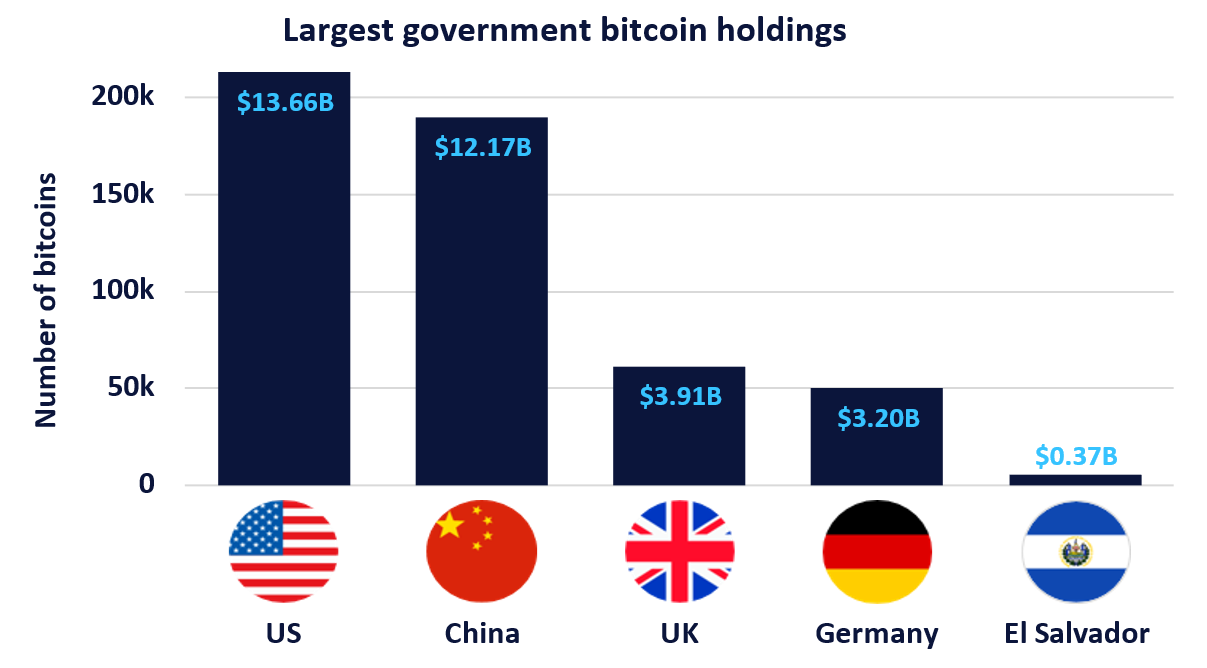
Governments around the world hold a combined 567,000 Bitcoins according to BitcoinTreasuries, worth over $36bn as of April 2024. However, the cryptocurrency isn’t being adopted by central banks just yet.
Which governments own bitcoin?
BitcoinTreasuries tracks the amount of Bitcoin on the balance sheets of companies and other large entities, including governments. The website is built and maintained by Coinkite, a leading Bitcoin security hardware manufacturer, and aggregates data from available sources such as SEC filings, quarterly reports, and press releases.
Known Bitcoin reserves held by governments account for 2.7% of the total 21 million supply of bitcoins, with the largest being the US Government with over 210,000 bitcoins worth more than $13bn at the time of writing.
For scale, public companies hold a combined 305,000 bitcoins, the majority of which is held by MicroStrategy, which has been accumulating bitcoin fervently since adopting the cryptocurrency as its primary treasury reserve asset in 2020. They even went so far as to rebrand as a “Bitcoin Development Company”. Yet despite all its efforts, MicroStrategy’s Bitcoin holdings have only recently surpassed the US Government’s—reaching 214,000 bitcoins in March 2024 with the purchase of an additional 9,000 bitcoins.
Are governments adopting Bitcoin as a reserve currency?
Only El Salvador is actively adopting Bitcoin, buying their first 200 Bitcoins, and making the cryptocurrency legal tender in 2021. El Salvador has managed to accumulate over 5,700 bitcoins through mining Bitcoin with Volcano Energy, selling passports, and buying one bitcoin per day.
Sometimes it really pays to fight crime
Neither the US, China, the UK, or Germany purchased their Bitcoins, instead, these vast fortunes were all seized from criminals. The US has the Silk Road to thank for its leading Bitcoin position, the infamous dark web marketplace was among the first use cases of the digital currency. The Silk Road was shut down by the FBI in 2013 when Bitcoin traded at around $100. China’s 190 thousand bitcoins were seized from the Ponzi scheme PlusToken in 2019. The UK came into possession of 61,000 Bitcoins after an ex-takeaway worker tried to buy a £23m mansion. In January 2024, Germany acquired 50,000 Bitcoins from the operators of a website called movie2k, suspected of “unauthorised commercial exploitation of copyrighted works”.
How well do you really know your competitors?
Access the most comprehensive Company Profiles on the market, powered by GlobalData. Save hours of research. Gain competitive edge.

Thank you!
Your download email will arrive shortly
Not ready to buy yet? Download a free sample
We are confident about the unique quality of our Company Profiles. However, we want you to make the most beneficial decision for your business, so we offer a free sample that you can download by submitting the below form
By GlobalDataWe can expect all these confiscated Bitcoins to eventually be auctioned off. Indeed, the US has already sold 195,000 Bitcoins, receiving a total of $366m. Today, those Bitcoin would be worth $12.6bn. If Bitcoin were to continue to perform as it has done in the past, by 2030 the US’ stash of 210,000 bitcoins would start to rival their central bank’s holdings of gold, currently worth over $600bn.
Tracking bitcoins, from the dark web to government pockets
Despite Bitcoin’s association with cybercrime and a reputation for anonymity, the transactions are in fact not anonymous but instead pseudonymous, with identities represented by unique cryptographic addresses. Details of every Bitcoin transaction are publicly available and can be perused through sites such as mempool.space. By analysing the blockchain, the real identity behind a Bitcoin address can be inferred. This level of transparency has aided in the catching of criminals but can also bring transparency to legitimate institutions. President of El Salvador, Nayib Bukele, shared the nation’s bitcoin address to X (formerly Twitter), so now anyone can check that they are sticking to their target of one Bitcoin per day.



